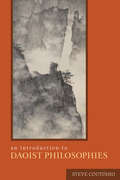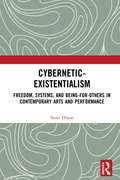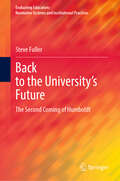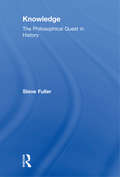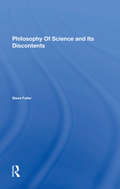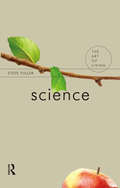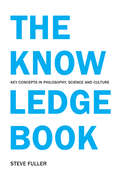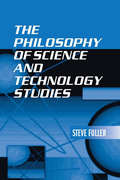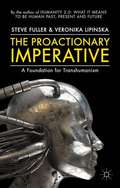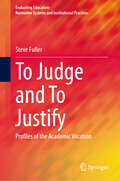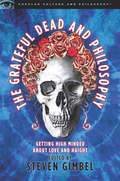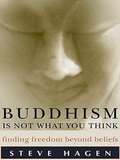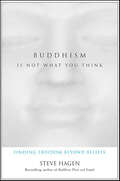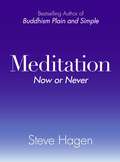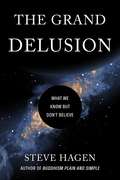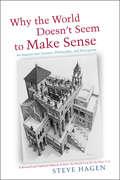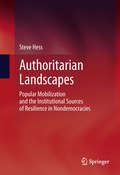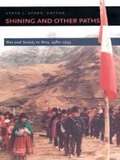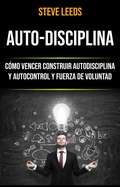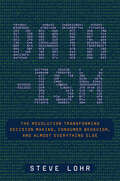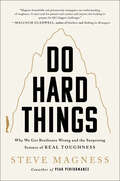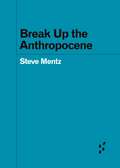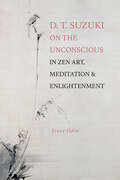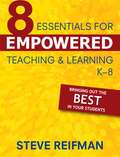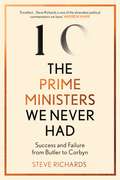- Table View
- List View
An Introduction to Daoist Philosophies
by Steve CoutinhoSteve Coutinho explores in detail the fundamental concepts of Daoist thought as represented in three early texts: the Laozi, the Zhuangzi, and the Liezi. Readers interested in philosophy yet unfamiliar with Daoism will gain a comprehensive understanding of these works from this analysis, and readers fascinated by ancient China who also wish to grasp its philosophical foundations will appreciate the clarity and depth of Coutinho's explanations.Coutinho writes a volume for all readers, whether or not they have a background in philosophy or Chinese studies. A work of comparative philosophy, this volume also integrates the concepts and methods of contemporary philosophical discourse into a discussion of early Chinese thought. The resulting dialogue relates ancient Chinese thought to contemporary philosophical issues and uses modern Western ideas and approaches to throw new interpretive light on classical texts. Rather than function as historical curiosities, these works act as living philosophies in conversation with contemporary thought and experience. Coutinho respects the multiplicity of Daoist philosophies while also revealing a distinctive philosophical sensibility, and he provides clear explanations of these complex texts without resorting to oversimplification.
Cybernetic-Existentialism: Freedom, Systems, and Being-for-Others in Contemporary Arts and Performance
by Steve DixonCybernetic-Existentialism: Freedom, Systems, and Being-for-Others in Contemporary Arts and Performance offers a unique discourse and an original aesthetic theory. It argues that fusing perspectives from the philosophy of Existentialism with insights from the ‘universal science’ of cybernetics provides a new analytical lens and deconstructive methodology to critique art. In this study, Steve Dixon examines how a range of artists’ works reveal the ideas of Existentialist philosophers including Kierkegaard, Camus, de Beauvoir, and Sartre on freedom, being and nothingness, eternal recurrence, the absurd, and being-for-others. Simultaneously, these artworks are shown to engage in complex explorations of concepts proposed by cyberneticians including Wiener, Shannon, and Bateson on information theory and ‘noise’, feedback loops, circularity, adaptive ecosystems, autopoiesis, and emergence. Dixon’s groundbreaking book demonstrates how fusing insights and knowledge from these two fields can throw new light on pressing issues within contemporary arts and culture, including authenticity, angst and alienation, homeostasis, radical politics, and the human as system.
Back to the University's Future: The Second Coming of Humboldt (Evaluating Education: Normative Systems and Institutional Practices)
by Steve FullerThis volume addresses the central question facing the future of higher education around the world, whether and why universities need to exist at all. This book accepts the question’s premise: It is not clear that the university is any longer needed as an institution -- that is, unless its defenders recover what had made the university the revolutionary institution that over the past two centuries has not only defined the shape of modern systematic inquiry but also the distinctiveness of the societies that have housed them. In short, what is required is a reanimation of the spirit of Wilhelm von Humboldt for our times; hence the book's title and subtitle. Humboldt was responsible for relaunching the university as the vanguard institution of 'Enlightenment' to which we continue to pay lip service – and sometimes not much more than that. Admittedly, the task of relaunching Humboldt today is made difficult because many of the concrete achievements associated with the Humboldtian university – not least academic disciplines and nation-states – are increasingly seen as problematic if not obsolete. However, the global reach of the Humboldtian vision in its 19th century and 20th century heyday offers hope that it may be recovered in the 21st century. The book focuses on the performative character of the academic vocation, what Humboldt memorably characterized as the 'unity of research and teaching' in the same person, a role model for students and society at large. The book's seven chapters develop this theme in a historically and philosophically nuanced way in terms of the Humboldtian vision of knowledge, sense of free expression and critical judgement, and commitment to translation and publicity.
Knowledge: The Philosophical Quest in History
by Steve FullerThe theory of knowledge, or epistemology, is often regarded as a dry topic that bears little relation to actual knowledge practices. Knowledge: The Philosophical Quest in History addresses this perception by showing the roots, developments and prospects of modern epistemology from its beginnings in the nineteenth century to the present day. Beginning with an introduction to the central questions and problems in theory of knowledge, Steve Fuller goes on to demonstrate that contemporary epistemology is enriched by its interdisciplinarity, analysing keys areas including: Epistemology as Cognitive Economics Epistemology as Divine Psychology Epistemology as Philosophy of Science Epistemology as Sociology of Science Epistemology and Postmodernism. A wide-ranging and historically-informed assessment of the ways in which man has - and continues to - pursue, question, contest, expand and shape knowledge, this book is essential reading anyone in the Humanities and Social Sciences interested in the history and practical application of epistemology.
Philosophy Of Science And Its Discontents
by Steve FullerThe most important and exciting recent development in the philosophy of science is its merging with the sociology of scientific knowledge. Here is the first text book to make this development available.
Science: The Struggle For The Soul Of Science (The Art of Living)
by Steve FullerIn this challenging and provocative book, Steve Fuller contends that our continuing faith in science in the face of its actual history is best understood as the secular residue of a religiously inspired belief in divine providence. Our faith in science is the promise of a life as it shall be, as science will make it one day. Just as men once put their faith in God's activity in the world, so we now travel to a land promised by science. In "Science", Fuller suggests that the two destinations might be the same one. Fuller sympathetically explores what it might mean to live scientifically. Can science give a sense of completeness to one's life? Can it account for the entirety of what it is to be human? And what does our continuing belief in scientific progress say about us as a species? In answering these questions, Fuller ranges widely over the history of science and religion - from Aristotle and the atomists to Dawkins and the neo-Darwinists - and takes a close look at what science is, how its purpose has changed over the years, and what role religion and in more recent years atheism have played in its progression. Science, argues Fuller, is now undergoing its own version of secularization. We are ceasing to trust science in its institutional forms, formulated by an anointed class of science priests, and instead we are witnessing the emergence of what Fuller calls Protscience' - all sorts of people, from the New Age movement to anti-evolutionists, claiming scientific authority as their own. Fuller shows that these groups are no more anti-scientific than Protestant sects were atheistic. Fearless and thought-provoking, Science questions some of our most fundamental beliefs about the nature and role of science, and is a distinct and important contribution to debates about evolution, intelligent design, atheism, humanism, the notion of scientific progress, and the public understanding of science.
The Knowledge Book: Key Concepts in Philosophy, Science and Culture
by Steve Fuller"The Knowledge Book" is a unique interdisciplinary reference work for students and researchers concerned with the nature of knowledge. It is the first work of its kind to be organized on the assumption that whatever else knowledge might be, it is intrinsically social. The book consists of 42 alphabetically arranged entries on key concepts at the intersection of philosophy and sociology - what used to be called "sociology of knowledge" but is now increasingly called "social epistemology". The entries include concepts common to disciplines that in recent years have devoted more of their attention to knowledge: cultural studies, communication studies, information science, education, policy studies and business studies. Special attention is given to concepts from the emerging field of science and technology studies. Each entry presents a short, self-contained essay providing an overview of a concept and concludes with suggestions for further reading. All the entries are fully cross-referenced, allowing readers to both make connections and follow their own interests.
The Philosophy of Science and Technology Studies: A New Beginning For Science And Technology Studies
by Steve FullerAs the field of Science and Technology Studies (STS) has become more established, it has increasingly hidden its philosophical roots. While the trend is typical of disciplines striving for maturity, Steve Fuller, a leading figure in the field, argues that STS has much to lose if it abandons philosophy. In his characteristically provocative style, he offers the first sustained treatment of the philosophical foundations of STS and suggests fruitful avenues for further research. With stimulating discussions of the Science Wars, the Intelligent Design Theory controversy, and theorists such as Donna Haraway and Bruno Latour, Philosophy of Science and Technology Studies is required reading for students and scholars in STS and the philosophy of science.
The Proactionary Imperative
by Steve FullerThe Proactionary Imperative debates the concept of transforming human nature, including such thorny topics as humanity's privilege as a species, our capacity to 'play God', the idea that we might treat our genes as a capital investment, eugenics and what it might mean to be 'human' in the context of risky scientific and technological interventions.
To Judge and To Justify: Profiles of the Academic Vocation (Evaluating Education: Normative Systems and Institutional Practices)
by Steve FullerThis book argues that judging and justifying are the two skills that specifically require academic training. In the current times, where the value of a university degree is increasingly questioned, it’s important to emphasize the significance of these skills. This volume addresses that universities are not necessarily stressing these skills, preferring instead to focus on the delivery of ‘content’ and the provision of ‘credentials’. Its main focus is on articulating the positive case for the university’s focus on judging and explaining as its core ‘transferable skills.’ It involves examining the historical and philosophical case for this claim, canvassing arguments made – and the example set -- by Plato, Francis Bacon, Immanuel Kant, William Whewell, Ludwig Wittgenstein, Paul Feyerabend, Richard Rorty, John Rawls and Robert Nozick – as well as considering how they might be realized in today’s world. This book extends the arguments in Fuller’s recent book, Back to the University’s Future: The Second Coming of Humboldt (Springer, 2023).
The Grateful Dead and Philosophy
by Steve GimbelThis book is another one of those late-night Grateful Dead inspired dorm room conversations with friends . . . only this time it's your professors sitting cross-legged on the floor asking if anyone else wants to order a pizza.The Grateful Dead emerged from the San Francisco counter-culture movement of the late 1960s to become an American icon. Part of the reason they remain an institution four decades later is that they and their fans, the Deadheads, embody deviation from social, artistic, and industry norms. From the beginning, the Grateful Dead has represented rethinking what we do and how we do it. Their long, free-form jams stood in stark contrast to the three minute, radio friendly, formulaic rock that preceded them. Allowing their fans to tape and trade recordings of shows and distributing concert tickets themselves bucked the corporate control of popular music. The use of mind-altering chemicals questioned the nature of consciousness and reality. The practice of "touring," following the band from city to city, living as modern day nomads presented a model distinct from the work-a-day option assumed by most in our corporate dominated culture. As a result, Deadheads are a quite introspective lot.The Grateful Dead and Philosophy contains essays from twenty professional philosophers whose love of the music and scene have led them to reflect on different philosophical questions that arise from the enigma that is the Grateful Dead. Coming from a variety of perspectives, ancient and modern, Eastern and Western, The Grateful Dead and Philosophy considers how the Grateful Dead fits into the broader trends of American thought running through pragmatism and the Beat poets, how the parking lot scene with its tie-dyed t-shirt and veggie burrito vendors was both a rejection and embrace of capitalism, and whether Jerry Garcia and the Buddha were more than just a couple of fat guys talking about peace. The lyrics of the Grateful Dead's many songs are also the basis for several essays considering questions of fate and freedom, the nature-nurture debate, and gamblers' ethics.
Buddhism Is Not What You Think: Finding Freedom Beyond Beliefs
by Steve HagenAccomplished Zen teacher explores some of the religions most essential questions. Draws on life experience and stories of various Buddhist teachers in order to dispel misconceptions and educate on topics such as wisdom, compassion, awareness, and what it means to be awake. Written in prose, The author's words are meant to appeal to newcomers and those who are already familiar with the faith. Hagen explains that Buddhism is based on life experience and not just thoughts about experience. The book aims to guide the reader towards a path to joy and freedom.
Buddhism Is Not What You Think: Finding Freedom Beyond Beliefs
by Steve HagenA practical, straight-forward guide to the true purpose of Buddhism, examining the essential & enduring questions at the heart of the Buddha’s teachings.Bestselling author and renowned Zen teacher Steve Hagen penetrates the most essential and enduring questions at the heart of the Buddha’s teachings: How can we see the world in each moment, rather than merely as what we think, hope, or fear it is? How can we base our actions on reality, rather than on the longing and loathing of our hearts and minds? How can we live lives that are wise, compassionate, and in tune with reality? And how can we separate the wisdom of Buddhism from the cultural trappings and misconceptions that have come to be associated with it?Drawing on down-to-earth examples from everyday life and stories from Buddhist teachers past and present, Hagen tackles these fundamental inquiries with his trademark lucid, straightforward prose. The newcomer to Buddhism will be inspired by this accessible and provocative introduction, and those more familiar with Buddhism will welcome this much needed hands-on guide to understanding what it truly means to be awake. By being challenged to question what we take for granted. We come to see the world as it truly is. Buddhism Is Not What You Think offers a profound and clear path to joy and freedom.Praise for Buddhism Is Not What You Think “Hagen’s writing flows in a tranquil way, like a spring trickling up effortlessly from the earth. One tends to stop judging it and just appreciate it for its own sake. Since this appreciation is his advice for dealing with everything, the sentences themselves actually create what they are describing.” —Robert M. Pirsig, author of Zen and the Art of Motorcycle Maintenance“This is not just another nice book about Buddhism, one telling us what we like to hear and are used to hearing. No—it is a clear and challenging showing of the fundamental truth of our lives. This is an exceptional book. Make good use of it.” —Charlotte Joko Beck, author of Everyday Zen
Meditation: Now or Never
by Steve HagenA simple, jargon-free introduction to meditation that’s “clear as a mountain stream” (Stephen Levine, author of A Year to Live).National bestselling author and teacher Steve Hagen strips away the cultural and religious jargon surrounding meditation and provides an accessible and thorough manual for newcomers and experienced practitioners alike. Inside you will find:Simple practices to avoid needlessly complicating meditationWhere most of us get stuck in meditation—and how to get unstuckA unique focus on meditation not simply as a spiritual technique, but as a way of living“For the beginner, a lucid, no-frills introduction to Buddhist meditation. For the practitioner, a timely reminder of what meditation is all about.” —Stephen Batchelor, author of Buddhism Without Beliefs“Brief and wonderfully accessible.” —Publishers Weekly
The Grand Delusion: What We Know But Don't Believe
by Steve HagenThis is a fun, unique book that goes deep into the great mysteries of knowing—and makes it enjoyable.In The Grand Delusion, bestselling author Steve Hagen drills deeply into the most basic assumptions, strengths, and limitations of religion and belief, philosophy and inquiry, science and technology. In doing so, he shines new light on the great existential questions—Why is there Something rather than Nothing? What does it mean to exist? What is consciousness? What is the nature of truth?—and does so from an entirely unexpected direction. Ultimately, this book reveals how all of our fundamental questions stem from a single error, a single unwarranted belief—a single Grand Delusion.
Why the World Doesn't Seem to Make Sense: An Inquiry into Science, Philosophy, and Perception
by Steve HagenThe bestselling author of Buddhism Plain and Simple ponders what we truly know about reality. Why the World Doesn&’t Seem to Make Sense is an eminently down-to-earth, practical, and non-technical response to the urgent questions posed by contemporary science and philosophy. This revised and updated edition of How the World Can Be the Way It Is includes new scientific understanding and clarification of some of its more complex ideas. Steve Hagen aims for an intelligent general audience not necessarily familiar with modern or classical physics, philosophy, or formal logic. Hagen takes us on a journey that examines our most basic assumptions about reality and carefully addresses the &“paradoxes of the one and the many&” that other works only identify. His primary purpose is to help us to perceive the world directly—as it is, not how we conceive it to be. Through this perception each of us can answer profound moral questions, resolve philosophical and ethical dilemmas, and live lives of harmony and joy. Praise for Why the World Doesn&’t Seem to Make Sense &“For those who are certain that objectivity and intellect are the ground floor of all knowledge, this can be a valuable tripe to the sub-basement.&” —Robert Pirsig, author of Zen and the Art of Motorcycle Maintenance &“An unusually stimulating and exhilarating book, of profound value to those seeking to clarify the essential nature of everyday existence—in short, all of us.&” —Peter Matthiessen, author of The Snow Leopard &“Read this book: it will change how you look at things.&” —Nick Herbert, PhD, author of Quantum Reality &“Hagen cuts cleanly through the duality of mind and body, perception and conception, science and religion, and takes us on a spell-binding journey through what we know—and what we only think we know—that ultimately provides a fresh, effective, and remarkably simple grounding for our lives. . . . Original, breathtaking, and beautiful.&” —Natalie Goldberg, author of Writing Down the Bones
Authoritarian Landscapes: Popular Mobilization and the Institutional Sources of Resilience in Nondemocracies
by Steve HessThe turbulent year of 2011 has brought the appearance of mass popular unrest and the collapse of long lived autocratic regimes in Egypt, Tunisia, Libya and possibly Syria. The sudden and unanticipated fall of these regimes - often thought of as exemplars of authoritarian resilience - has brought much of the conventional wisdom on the durability and vulnerability of nondemocratic regimes into question. This book seeks to advance the existing literature by treating the autocratic state not as a unitary actor characterized by strength or weakness but rather as a structure or terrain that can alternatively inhibit or facilitate the appearance of national level forms of protests. In the mode of the Arab Spring, the color revolutions of the former Soviet Union, and the people power movement of the Philippines, such movements overcome the daunting impediments presented by autocrats, appeal to likeminded counterparts across society, and overwhelm the ability of regimes to maintain order. Conversely, in other settings, such as contemporary China, decentralized state structures provide an inhospitable environment for national-level protest, leading collective actors to opt for more local and parochial forms of contention. This outcome produces paradoxical situations, such as in the PRC, where protests are frequent but national-level mobilization and coordination is absent.
Shining and Other Paths: War and Society in Peru, 1980-1995
by Steve J. SternShining and Other Paths offers the first systematic account of the social experiences at the heart of the war waged between Shining Path and the Peruvian military during the 1980s and early 1990s. Confronting and untangling the many myths and enigmas that surround the war and the wider history of twentieth-century Peru, this book presents clear and often poignant analyses of the brutal reshaping of life and politics during a war that cost tens of thousands of lives.The contributors--a team of Peruvian and U.S. historians, social scientists, and human rights activists--explore the origins, social dynamics, and long-term consequences of the effort by Shining Path to effect an armed communist revolution. The book begins by interpreting Shining Path's emergence and decision for war as one logical culmination, among several competing culminations, of trends in oppositional politics and social movements. It then traces the experiences of peasants and refugees to demonstrate how human struggle and resilience came together in grassroots determination to defeat Shining Path, and explores the unsuccessful efforts of urban shantytown dwellers, as well as rural and urban activists, to build a "third path" to social justice. Integral to this discussion is an examination of women's activism and consciousness during the years of the crisis. Finally, this book analyzes the often paradoxical and unintended legacies of this tumultuous period for social and human rights movements, and for presidential and military leadership in Peru.Extensive field research, broad historical vision, and strong editorial coordination enable the authors to write a coherent and deeply humanistic account, one that draws out the inner tragedies, ambiguities, and conflicts of the war.Providing historically grounded explication of the conflicts that reshaped contemporary Peru, Shining and Other Paths will be widely read by Latin Americanists, historians, anthropologists, gender theorists, sociologists, political scientists, and human rights activists.Contributors. Jo-Marie Burt, Marisol de la Cadena, Isabel Coral Cordero, Carlos Iván Degregori, Iván Hinojosa, Carlos Basombrío Iglesias, Florencia E. Mallon, Nelson Manrique, Hortensia Muñoz, Enrique Obando, Patricia Oliart, Ponciano del Pino H., José Luis Rénique, Orin Starn, Steve J. Stern
Auto-Disciplina: Cómo Vencer Construir Autodisciplina Y Autocontrol Y Fuerza De Voluntad
by Steve LeedsUn libro de autosuperación que por medio de pasos lógicos conduce por un camino de auto control, y crecimiento d ela fuerzza de voluntad, elementos indispensables en el camino al éxito.
Data-ism: The Revolution Transforming Decision Making, Consumer Behavior, and Almost Everything Else
by Steve Lohr“Lohr uses his Pulitzer Prize-winning reporting skills to dig into and explain the power, pervasiveness, and potential downside of big data.” —Library JournalIn Data-ism, New York Times reporter Steve Lohr explains how big-data technology is ushering in a revolution in proportions that promise to be the basis of the next wave of efficiency and innovation across the economy. But more is at work here than technology. Big data is also the vehicle for a point of view, or philosophy, about how decisions will be—and perhaps should be—made in the future. Lohr investigates the benefits of data while also examining its dark side.Data-ism is about this next phase, in which vast Internet-scale data sets are used for discovery and prediction in virtually every field. It shows how this new revolution will change decision making—by relying more on data and analysis, and less on intuition and experience—and transform the nature of leadership and management. Focusing on young entrepreneurs at the forefront of data science as well as on giant companies such as IBM that are making big bets on data science for the future of their businesses, Data-ism is a field guide to what is ahead, explaining how individuals and institutions will need to exploit, protect, and manage data to stay competitive in the coming years. With rich examples of how the rise of big data is affecting everyday life, Data-ism also raises provocative questions about policy and practice that have wide implications for everyone.The age of data-ism is here. But are we ready to handle its consequences, good and bad?
Do Hard Things: Why We Get Resilience Wrong and the Surprising Science of Real Toughness
by Steve MagnessNational Bestseller"In Do Hard Things, Steve Magness beautifully and persuasively reimagines our understanding of toughness. This is a must-read for parents and coaches and anyone else looking to prepare for life's biggest challenges." -- Malcolm Gladwell, author of Outliers and Talking to Strangers and host of the Revisionist History podcastFrom beloved performance expert, executive coach, and coauthor of Peak Performance Steve Magness comes a radical rethinking of how we perceive toughness and what it means to achieve our high ambitions in the face of hard things.Toughness has long been held as the key to overcoming a challenge and achieving greatness, whether it is on the sports field, at a boardroom, or at the dining room table. Yet, the prevailing model has promoted a mentality based on fear, false bravado, and hiding any sign of weakness. In other words, the old model of toughness has failed us.Steve Magness, a performance scientist who coaches Olympic athletes, rebuilds our broken model of resilience with one grounded in the latest science and psychology. In Do Hard Things, Magness teaches us how we can work with our body – how experiencing discomfort, leaning in, paying attention, and creating space to take thoughtful action can be the true indications of cultivating inner strength. He offers four core pillars to cultivate such resilience: Pillar 1- Ditch the Façade, Embrace RealityPillar 2- Listen to Your BodyPillar 3- Respond, Instead of React Pillar 4- Transcend Discomfort Smart and wise all at once, Magness flips the script on what it means to be resilient. Drawing from mindfulness, military case studies, sports psychology, neuroscience, psychology, and philosophy, he provides a roadmap for navigating life’s challenges and achieving high performance that makes us happier, more successful, and, ultimately, better people.
Break Up the Anthropocene (Forerunners: Ideas First)
by Steve MentzTakes the singular eco-catastrophic &“Age of Man&” and redefines this epoch We live in a new world: the Anthropocene. The Age of Man is defined in many ways, and most dramatically through climate change, mass extinction, and human marks in the geological record. Ideas of the Anthropocene spill out from the geophysical sciences into the humanities, social sciences, the arts, and mainstream debates—but it&’s hard to know what the new coinage really means. Break Up the Anthropocene argues that this age should subvert imperial masculinity and industrial conquest by opening up the plural possibilities of Anthropocene debates of resilience, adaptation, and the struggle for environmental justice. Forerunners: Ideas First Short books of thought-in-process scholarship, where intense analysis, questioning, and speculation take the lead
D. T. Suzuki on the Unconscious in Zen Art, Meditation, and Enlightenment (SUNY series, Perspectives in Contemplative Studies)
by Steve OdinA comprehensive study of D. T. Suzuki's Zen philosophy and philosophical psychology in relation to his Buddhist understanding of the "cosmic Unconscious."This book explores how the Japanese philosopher D. T. Suzuki (1870–1966) developed an integral synthesis of Eastern and Western sources to establish a modern philosophical psychology of the "cosmic Unconscious," which he in turn used as the basis to interpret every aspect of Zen art, meditation, and enlightenment. Beyond Freud's personal unconscious and Jung's collective unconscious, according to Suzuki, is the cosmic Unconscious of Zen, which as absolute nothingness is the fountain of inexhaustible creative potentialities and the source of all Zen-inspired arts. The book demonstrates that, like the Kyoto School of modern Japanese philosophy, Suzuki's Zen endeavors to overcome the existential problem of nihilism or relative nothingness by shifting to the openness of absolute nothingness wherein emptiness is fullness and all things are disclosed in the evanescent beauty of their suchness. Suzuki, however, formulates his scheme in terms of a depth psychology where the cosmic Unconscious is the encompassing locus of absolute nothingness. Ultimately, the book argues that, by integrating both Eastern and Western views of the unconscious psyche, including the different schools of Zen and Mahayana Buddhism, as well as American, French, and German theories of the unconscious, Suzuki's Zen concept of the cosmic Unconscious constitutes a significant original contribution to philosophical psychology.
Eight Essentials for Empowered Teaching and Learning, K-8: Bringing Out the Best in Your Students
by Steve ReifmanInspirational and practical, this book focuses on the quality of teaching and learning in elementary and middle school classrooms and helps teachers and students find more joy, satisfaction, and meaning in their work.Experienced teacher Steve Reifman defines a quality classroom in reader-friendly terms, explains how to measure quality, and covers the conditions under which all students are empowered to reach their full potential. The author synthesizes key concepts from the fields of education, psychology, management, and personal growth to arrive at the eight essential elements of teaching, including realistic goal setting, assessment-oriented instruction, parent involvement, and teacher leadership. Written in an engaging personal voice and drawing upon the work of experts such as Stephen Covey, Howard Gardner, Ted Sizer, William Glasser, Carol Ann Tomlinson, Alfie Kohn, and Alan Blakenstein, this resourcePromotes student motivation and a classroom environment of trust and respectBuild higher-level thinking and group problem solving into the curriculumPresents classroom applications, examples, anecdotes, and reproducible pagesFeatures ideas from practicing teaching for putting these essential ideas to work in the classroomEight Essentials for Empowered Teaching and Learning, K-8 motivates student teachers, beginning teachers, and veteran educators to become the most effective instructors they can be and achieve the best learning outcomes possible for their students.
The Prime Ministers We Never Had: Success and Failure from Butler to Corbyn
by Steve RichardsBOOK OF THE YEAR, The Times, Guardian and ProspectWas Harold Wilson a bigger figure than Denis Healey? Was John Major more 'prime ministerial' than Michael Heseltine? Would David Miliband have become prime minister if it were not for his brother Ed? Would Ed have become prime minister if it were not for David? How close did Jeremy Corbyn come to being prime minister?In this piercing and original study, journalist and commentator Steve Richards looks at eleven prime ministers we never had, examining what made each of these illustrious figures unique and why they failed to make the final leap to the very top. Combining astute insights into the demands of leadership with compelling historical analysis, this fascinating exploration of failure and success sheds new light on some of the most compelling characters in British public life.
